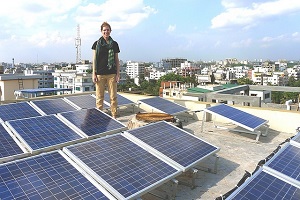Lessons from supporting Bangladesh’s INDC
Lessons from supporting Bangladesh’s INDC
James Harries of Ricardo of Energy & Environment shares what he learned as part of a CDKN project to assist the Government of Bangladesh develop its national climate proposal for the United Nations: its Intended Nationally Determined Contribution (INDC).
There was a great deal of attention and excitement in December 2015 at the outcome of the United Nations (UN) Conference of the Parties that took place in Paris. And rightly so – it was a hugely important result for the climate, both demonstrating the collective ambition of the international community and providing for the establishment of a national accounting framework going forward. While the world’s attention has been focused on the global picture, it is also important not to lose sight of what this all means for individual countries as their negotiators return home. Ricardo Energy & Environment is delighted to have played its part in the run-up to the Paris conference – one of the countries we supported was Bangladesh, where we worked with Dhaka-based Nature Conservation Management (NACOM) through CDKN's support to assist the Government of Bangladesh in developing its INDC. This gave us an invaluable insight into some of the issues and challenges facing countries as they move forward in implementing their INDCs. So what did we learn from this process?
Developing countries are ‘stepping up to the plate’
Bangladesh’s INDC demonstrates its commitment to being a progressive voice in the international climate change negotiations. There are many encouraging and progressive aspects to the INDC, not least the fact that for the first time it sets a quantified target for greenhouse gas emissions from key sectors and that it shows Bangladesh’s willingness to take some action unilaterally, despite its status as a least developed country. It also includes language on the longer term which links its development objectives to the emissions reductions required by science in the Intergovernmental Panel on Climate Change’s Fifth Assessment Report. The INDCs submitted by countries like Bangladesh were key to the success in Paris in reaching a genuinely global agreement. And it shows that despite adaptation to climate change being a primary concern for countries like Bangladesh, there is also a tangible interest in playing their part in efforts to reduce greenhouse gases.
[caption id="attachment_60681" align="alignleft" width="300"] Solar power array, Bangladesh, courtesy Exchanges[/caption]
Solar power array, Bangladesh, courtesy Exchanges[/caption]
Countries may be able to go further
The UN has calculated that the collective action set out in all the INDCs submitted so far falls short of what is needed to prevent dangerous climate change. But this is not necessarily cause for despair. There is no reason why the INDCs should be the last word and there may be scope for countries to over-achieve the levels of reductions specified, in particular if sufficient support is provided by the international community. For example, due to lack of reliable data, the quantified contribution in Bangladesh’s INDC focuses on three sectors – power, transport and industry. Bangladesh has already stated that, with appropriate support, it might be able to consider mitigation potential in other sectors (Editor's note: the possibility to reduce or avoid greenhouse gas emissions in other parts of the economy). If this situation is replicated in other countries, there may be scope to close the current gap to the 2 degrees objective - the gap between countries' overall commitments and the amount of emissions reduction needed to limit global warming by 2 degrees - by reviewing overall levels of effort prior to 2020. The trick will be to identify where such scope exists in the short term.
Barriers to ambition are not insurmountable
As mentioned, data was a key uncertainty that prevented the Government of Bangladesh from going further. Data availability and robustness will need to be addressed if Bangladesh is to successfully achieve the emissions reductions identified in its INDC. Doing simple things, such as building the institutional and human capacity for analysis within government and good data archiving, will also make future work more efficient as it will be easier to build on previous work rather than having to start again from first principles. And as outlined above, it may even be key to unlocking further ambition. Data is by no means the only barrier to implementation in a country like Bangladesh, but does represent a clear first target which can be overcome at relatively low cost.
An ambitious agreement in Paris is only the beginning!
The submission of Bangladesh’s INDC represents the beginning of a process; focus will now turn to how the undertakings set out in the INDC are implemented. As summarised in Ricardo Energy & Environment’s recent white paper, this will require development of a long term mitigation strategy, integrated adaptation planning, climate finance frameworks and a tailored system for measurement, reporting and verification of impacts (MRV). In addition, INDC implementation in Bangladesh will be dependent on effective governance arrangements integrated with delivery of the 5 year plans, as well as strong political will from the top. I’m sure that after the conference in Paris, all the negotiators are keen for a rest and a cup of tea. But in fact the real job starts now!
For further information: james.harries@ricardo.com or CDKN's Head of Negotiations Support, kiran.sura@uk.pwc.com
Picture Courtesy: DfID
